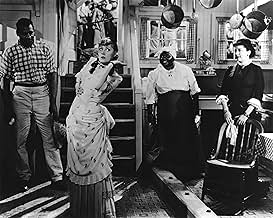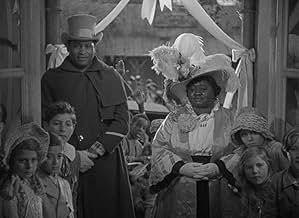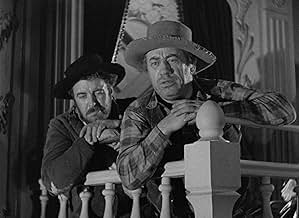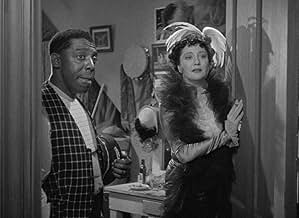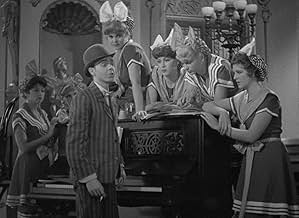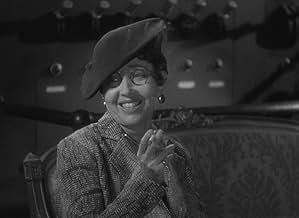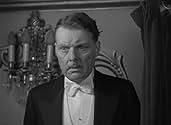VALUTAZIONE IMDb
7,4/10
3910
LA TUA VALUTAZIONE
Aggiungi una trama nella tua linguaDespite her mother's objections, the naive young daughter of a show boat captain is thrust into the limelight as the company's new leading lady.Despite her mother's objections, the naive young daughter of a show boat captain is thrust into the limelight as the company's new leading lady.Despite her mother's objections, the naive young daughter of a show boat captain is thrust into the limelight as the company's new leading lady.
- Regia
- Sceneggiatura
- Star
- Premi
- 3 vittorie e 1 candidatura in totale
Maude Allen
- Fat Woman
- (non citato nei titoli originali)
Recensioni in evidenza
This neglected gem is the closest rendering we have to what the authors originally intended to communicate in one of the most important musicals of the twentieth century.
It preserves performances by several of the original cast members, including the great Paul Robeson and Helen Morgan, singing their most famous signature tunes.
The American Musical Theater came of age with this show, which depicts domestic abuse, alcoholism & racial oppression and contains one of the most glorious musical scores ever written for any medium.
It's sad that this landmark production has not been remastered for DVD.
It preserves performances by several of the original cast members, including the great Paul Robeson and Helen Morgan, singing their most famous signature tunes.
The American Musical Theater came of age with this show, which depicts domestic abuse, alcoholism & racial oppression and contains one of the most glorious musical scores ever written for any medium.
It's sad that this landmark production has not been remastered for DVD.
Sadly not available yet on DVD, the classic black-and-white 1936 version of the seminal 1927 Oscar Hammerstein-Jerome Kern musical is rarely seen these days since it's been overshadowed by the far more elaborate 1951 MGM color remake (which is on DVD). That's a shame since this one is like a piece of cameo jewelry from a bygone era, a sublimely entertaining piece of Americana so naïve in its approach that its pervasive use of racial stereotypes comes across more as quaint than demoralizing.
Directed by James Whale (the protagonist of 1998's "Gods and Monsters" and most famous for his 1931 classic, "Frankenstein"), it's a multi-generational story that starts with the Hawks family who runs a variety entertainment showboat in the 1880's. The jovial Captain Andy is the boat's impresario who is constantly goaded by his mean-spirited wife Parthy. They have a musically inclined daughter Magnolia who is best friends with the show's star, mulatto chanteuse Julie LaVerne. The local sheriff forces Julie out of the show for being half-black. Andy has Magnolia take her place just as gambler Gaylord Ravenal comes to town and becomes recruited as the show's leading man. Gaylord and Magnolia fall immediately in love, marry, move to Chicago and have a girl they named Kim. There, he gains and loses a fortune and then leaves Magnolia and Kim. Over the years, Magnolia becomes a big stage star and passes the torch to Kim.
The music, of course, is unbeatable with standards, chief among them "Make Believe", "Can't Help Lovin' That Man" and "You Are Love". Even though Irene Dunne was in her late thirties when she made this film, she amazingly gets away with the first half where she plays Magnolia as an ingénue. What's more, she was the rare actress who could act and sing (quite beautifully) at the same time, even when she is required to perform in blackface in "Gallivantin' Around". Allan Jones is a fine singer as Gaylord, though not as interesting an actor especially in the second half when misfortune takes over. When they sing "You Are Love" together, it's still quite magical.
What a treat to be able to see the redoubtable Paul Robeson as Joe singing "Ol' Man River" so powerfully (and filmed with an intriguing montage of woeful images), as well as legendary torch singer Helen Morgan play Julie and perform her signature song, "Bill", so touchingly. Familiar character actor Charles Winninger probably has his best role as Captain Andy, while Hattie McDaniel plays Joe's forceful wife Queenie in a performance as good as her Mammy in "Gone With the Wind". The film is really an intriguing mix of melodrama and great music with socially relevant observations regarding racism, alcoholism and gambling addiction.
Directed by James Whale (the protagonist of 1998's "Gods and Monsters" and most famous for his 1931 classic, "Frankenstein"), it's a multi-generational story that starts with the Hawks family who runs a variety entertainment showboat in the 1880's. The jovial Captain Andy is the boat's impresario who is constantly goaded by his mean-spirited wife Parthy. They have a musically inclined daughter Magnolia who is best friends with the show's star, mulatto chanteuse Julie LaVerne. The local sheriff forces Julie out of the show for being half-black. Andy has Magnolia take her place just as gambler Gaylord Ravenal comes to town and becomes recruited as the show's leading man. Gaylord and Magnolia fall immediately in love, marry, move to Chicago and have a girl they named Kim. There, he gains and loses a fortune and then leaves Magnolia and Kim. Over the years, Magnolia becomes a big stage star and passes the torch to Kim.
The music, of course, is unbeatable with standards, chief among them "Make Believe", "Can't Help Lovin' That Man" and "You Are Love". Even though Irene Dunne was in her late thirties when she made this film, she amazingly gets away with the first half where she plays Magnolia as an ingénue. What's more, she was the rare actress who could act and sing (quite beautifully) at the same time, even when she is required to perform in blackface in "Gallivantin' Around". Allan Jones is a fine singer as Gaylord, though not as interesting an actor especially in the second half when misfortune takes over. When they sing "You Are Love" together, it's still quite magical.
What a treat to be able to see the redoubtable Paul Robeson as Joe singing "Ol' Man River" so powerfully (and filmed with an intriguing montage of woeful images), as well as legendary torch singer Helen Morgan play Julie and perform her signature song, "Bill", so touchingly. Familiar character actor Charles Winninger probably has his best role as Captain Andy, while Hattie McDaniel plays Joe's forceful wife Queenie in a performance as good as her Mammy in "Gone With the Wind". The film is really an intriguing mix of melodrama and great music with socially relevant observations regarding racism, alcoholism and gambling addiction.
Superb casting, wonderful music, and simple but literate dialogue. Paul Robeson's rendition of Old Man River is captivating, and this film is the only time I've heard the second stanza of the song which I'm sure many people would feel is not politically correct for our day. This really is an elegant production.
What an exquisite and enjoyable film! Along with "The Great Garrick"(1937), "The Old Dark House"(1932) and "The Bride of Frankenstein"(1935), "Show Boat" is one of James Whale's loveliest and most enduring classics. By far, the best "Show Boat" ever captured on film. The plush 1951 MGM remake is a cartoon by comparison.
Like Whale's "The Great Garrick," the film is a delicate, self-reflexive study about the entrancing possibilities of the theater, or for that matter acting. Acting as a metaphor for life. One of delights of "Show Boat" is that it does not avoid depicting either the joy of make-belief (the basis of the theater) or its inevitable heartbreak. In this regard, it invites comparison to Jean Renoir's exquisite "French Cancan"(1955), another back stage musical that understands, accepts, and celebrates the difficulties and ultimately the magic of the theater.
In addition to being an honest and frank celebration of miscegenation, "Show Boat" is also a genuinely felt evocation of a stage actress (wonderfully played by Irene Dunne in one of her greatest performances ever), who goes from a stagestruck teen to a mature woman seriously dealing with the consequences of a marriage to a gambler(played by the occasionally bland Allan Jones).
Paul Robeson's extraordinary, melodious rendition of "Ol' Man River" is the highlight of the film, occasioning in great and inventive montage sequence.
A great film.
Like Whale's "The Great Garrick," the film is a delicate, self-reflexive study about the entrancing possibilities of the theater, or for that matter acting. Acting as a metaphor for life. One of delights of "Show Boat" is that it does not avoid depicting either the joy of make-belief (the basis of the theater) or its inevitable heartbreak. In this regard, it invites comparison to Jean Renoir's exquisite "French Cancan"(1955), another back stage musical that understands, accepts, and celebrates the difficulties and ultimately the magic of the theater.
In addition to being an honest and frank celebration of miscegenation, "Show Boat" is also a genuinely felt evocation of a stage actress (wonderfully played by Irene Dunne in one of her greatest performances ever), who goes from a stagestruck teen to a mature woman seriously dealing with the consequences of a marriage to a gambler(played by the occasionally bland Allan Jones).
Paul Robeson's extraordinary, melodious rendition of "Ol' Man River" is the highlight of the film, occasioning in great and inventive montage sequence.
A great film.
10preppy-3
The BEST version ever of the musical. It follows a show boat and the family that runs it through three generations concentrating on Magnolia (Irene Dunne) and her husband Ravenel (Allen Jones).
Some people have complained that Dunne's high-pitched singing voice is TOO high-pitched...they're not completely wrong. Still she sings in tune and her "Make Believe" duet with Jones is just great. Actually all the songs are great and belted out by the cast--highlights are "Can't Help Lovin' That Man", "Bill" and the great Paul Robeson doing "Old Man River". The movie also is very faithful to the stage play--it has almost all the songs and manages to fit a 3 hour play into a 2 hour film. The last section with Kim seems rushed but that's understandable.
Dunne is just great as Magnolia--very sweet and lovable. The only strange point is her dancing to "Can't Help..."--the dress is way too constricting and she has a strange look on her face. Jones is wooden but but has a wonderful singing voice. Helen Morgan was taken from the stage show to recreate Julie. She stops the movie TWICE with "Can't Help..." and "Bill". She has a beautiful voice and is a superb actress. Her character disappears completely halfway through...but it's the same in the stage play. In the book her character ends up working in a house of prostitution--there was NO way they could have gotten that on the screen back in 1936! Everybody else is great and the movie moves very quickly.
It's much better than the 1950s version. The 50s version IS in color and opens with a great number...but most of the singing is overdubbed, the story is brutally cut down and "Can't Help..." is thrown away!
This has it all over that one. Also director James Whale reportedly liked this one above all his other films--he did a few other little films like "Frankenstein" and "Bride of Frankenstein"! Beautiful songs, some truly lovely photography (the moonlight scenes on top of the showboat are dreamlike) and a quick story. Just simply one of the great Hollywood musicals. A must see!
Some people have complained that Dunne's high-pitched singing voice is TOO high-pitched...they're not completely wrong. Still she sings in tune and her "Make Believe" duet with Jones is just great. Actually all the songs are great and belted out by the cast--highlights are "Can't Help Lovin' That Man", "Bill" and the great Paul Robeson doing "Old Man River". The movie also is very faithful to the stage play--it has almost all the songs and manages to fit a 3 hour play into a 2 hour film. The last section with Kim seems rushed but that's understandable.
Dunne is just great as Magnolia--very sweet and lovable. The only strange point is her dancing to "Can't Help..."--the dress is way too constricting and she has a strange look on her face. Jones is wooden but but has a wonderful singing voice. Helen Morgan was taken from the stage show to recreate Julie. She stops the movie TWICE with "Can't Help..." and "Bill". She has a beautiful voice and is a superb actress. Her character disappears completely halfway through...but it's the same in the stage play. In the book her character ends up working in a house of prostitution--there was NO way they could have gotten that on the screen back in 1936! Everybody else is great and the movie moves very quickly.
It's much better than the 1950s version. The 50s version IS in color and opens with a great number...but most of the singing is overdubbed, the story is brutally cut down and "Can't Help..." is thrown away!
This has it all over that one. Also director James Whale reportedly liked this one above all his other films--he did a few other little films like "Frankenstein" and "Bride of Frankenstein"! Beautiful songs, some truly lovely photography (the moonlight scenes on top of the showboat are dreamlike) and a quick story. Just simply one of the great Hollywood musicals. A must see!
Lo sapevi?
- QuizSpecial permission had to be granted from the Hays Office in order to retain the famous miscegenation (interracial marriage) sequence in the movie. Miscegenation was banned as a film subject, and had been excluded from Show Boat (1929).
- BlooperWhen Joe begins to sing "Ol' Man River", he picks up a board and begins to whittle it. He slices off two pieces, and then the camera switches to an oblique shot, but now the board is whittled to a slender rod.
- Curiosità sui creditiIn the opening credits, there is a cardboard cutout display of a show boat parade, with cutout paper townspeople watching it, on a moving turntable. The parade revolves past the camera carrying cardboard banners on which are printed the title and other credits. Most of the parade figures are simply figures, but among them cutouts of Paul Robeson and Helen Morgan can be seen. (The appearance of these figures does not coincide with the appearance of their names onscreen.) In the background shadows of a paddlewheel and a riverboat can be seen.
- ConnessioniFeatured in The All Talking, All Singing, All Dancing Show (1973)
- Colonne sonoreCotton Blossom
(1927) (uncredited)
Music by Jerome Kern
Lyrics by Oscar Hammerstein II
Sung by offscreen mixed chorus (during opening credits) and in opening scene by mixed chorus of dock workers
I più visti
Accedi per valutare e creare un elenco di titoli salvati per ottenere consigli personalizzati
Dettagli
- Tempo di esecuzione
- 1h 53min(113 min)
- Colore
- Proporzioni
- 1.37 : 1
Contribuisci a questa pagina
Suggerisci una modifica o aggiungi i contenuti mancanti

